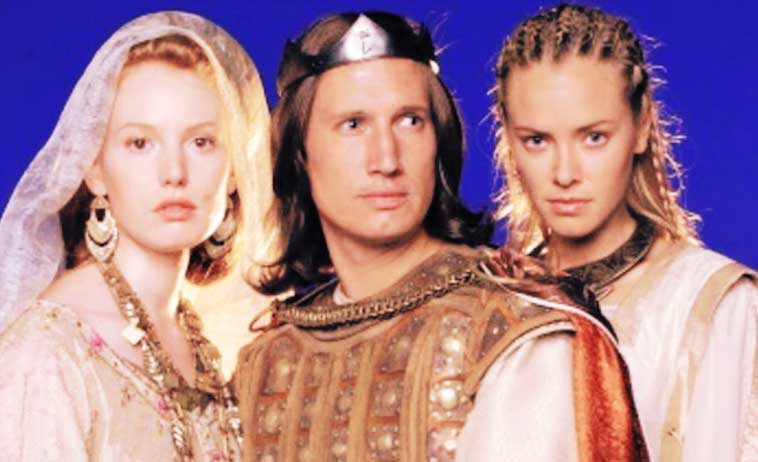Dark Kingdom (2004)
I love good fantasy stories, particularly those that borrow from ancient mythology. The Nordic legend that inspired this one also contributed greatly to J.R.R. Tolkien's inspiration for The Lord of the Rings. As such, you will see numerous parallels and similarities.
When the kingdom is assaulted and burned to the ground by invading Saxtons, the king's only son is set adrift on a piece of wood down the river. He manages to survive that terrible night but never remembers what happened. Taken in by a local blacksmith, Siegfried (Benno Furmann) grows to be a fine swordsman. He catches the passing attention of Brunnhild (Kristanna Lken), Warrior Queen of Iceland, as she is passing through the territory on one of her hunting expeditions. The queen's seer has predicted that when the skies rain down fire, she will meet her match, the one man chosen to defeat her and become her equal. That night a meteor strikes the earth, and Brunnhild and Siegfried are both drawn to the site. They battle, make love, and declare their affection to one another before parting ways, with the promise to meet again.
Desirous of becoming worthy of his fair maiden, Siegfried journeys to the kingdom's central city with his father, in order to deliver new swords to the king and his knights. The neighboring territories are being terrorized by a mighty dragon that has recently awakened, and guards a cursed treasure deep within the craters of the earth. King Gunther (Samuel West) takes a battalion of knights to war against it, but his forces are destroyed. In his absence, Siegfried forges a sword from the meteor and sets out in secret to slay the dragon. What transpires thereafter sets in motion a series of events that involve deception, ghostly warnings, and the vow that whoever possesses the treasure will be brought to ruin. Not all legends have happy endings and this one doesn't either, but I was fascinated with the journey the miniseries took us on into another world, another time, a distant place in which magic still dwelled.
They mention Christianity as spreading throughout the earth on numerous occasions, but it is clear that this story delves into Nordic gods and pagan rites. Most of it is not threatening and inoffensive, although there will be a little brow furrowing at one or two comments about the worthlessness of Christianity. There are various forms of magic, and a seer throws stones with numerals carved on them in order to divine the future on two separate occasions. Siegfried uses a headdress to transform into other people in order to win battles and deceive his enemies. This takes a slightly darker turn when he assumes the form of King Gunther in order to disarm the queen of the magical belt that prevents the king from sleeping with her. Some of the early battle scenes are painfully bad, but later hand to hand combat is quite impressive. Overall I found it an enjoyable way to spend several hours. There were so many aspects that reminded me of Tolkien's work -- a cursed ring, a dragon with a cave full of treasure, the people of the mist, a warrior woman, the queen a secret son of a king attempts to win over -- that for awhile it was difficult to settle into it, but it remains that Dark Kingdoms is a surprisingly well made and ambitious project, well worth your time if you're a fan of the genre.
Sexual Content:
Literally minutes after their first meeting, Siegfried and Brunnhild lay down in the middle of a crater and make love. It's a fairly
lengthy montage of shots of them kissing and caressing, in various stages of
undress. Part of her bare breast is seen. Brunnhild is later married and refuses
her husband his rights in the marriage bed. He attempts to subdue her, but she
throws him to the ground and ties him up. Siegfried in the king's form struggles
with her a second time, and removes the magical belt that remains her source of
power. He leaves the room, and the real king enters. There is brief nonsexual
backside nudity on Siegfried when he climbs into a pool of dragon's blood (it
makes him invincible). Language: None noted. Violence: Some non-graphic battle scenes. Other:
Pagan magic.

